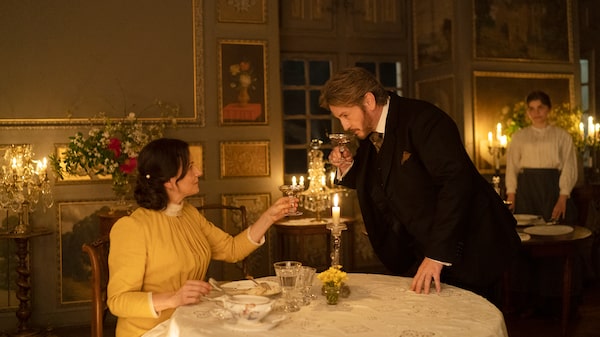The Taste of Things
Written and directed by Tran Anh Hung
Starring Juliette Binoche and Benoît Magimel
Classification PG; 134 minutes
Opens in Toronto and Vancouver Feb. 16, expanding to other cities Feb. 23
Critic’s Pick
Considering the twinned elements necessary in creating both cinema and haute cuisine – the specificity and rigour, the aesthetic harmonies and sensory overloads – there have been curiously few top-tier food films produced that are worth savouring. Big Night, Babette’s Feast, Jiro Dreams of Sushi, perhaps the Nic Cage drama Pig – and we’re definitely not counting “restaurant” movies, of which there are almost too many. Either way, whatever has been served up thus far feels like the burnt ends of a needlessly fussy amuse bouche compared to the new French film The Taste of Things, the finest marriage yet between the eyes of the moviegoer and the stomach of a gourmand.
The culinary-cum-cinematic magic smacks you across the lips right from the start, when director Tran Anh Hung offers a half-hour long sequence detailing the preparation of a deceptively humble lunch. It is 1889 in the French countryside, and Dodin Bouffant (Benoît Magimel), the “Napoleon of culinary arts,” is overseeing the day’s meal prep alongside two young apprentices and his long-time house chef, Eugénie (Juliette Binoche) in his home kitchen. As the camera swirls about the hectic space – deftly weaving in, out, around and on top of Dodin and Eugénie, the way a particularly adept server might navigate a hectic restaurant kitchen – Hung not only reveals the meticulous steps involved in cooking a grand, almost painfully appetizing meal (veal loins, crayfish, baked Alaska), but he also sketches out the details of a curious relationship.
Too many movies on your to-watch list? Here are the best films of 2023
Dodin and Eugénie might share the same home, but only infrequently do they occupy the same bed. This is much to Dodin’s dismay and Eugénie’s pride. And for the past two decades or so, Dodin has grudgingly accepted these rules, the two more or less establishing roles as equals inside their culinary bubble. (Just how Dodin affords such rustic luxury, and the ability to house apprentices, without seeming to operate an actual restaurant is never quite explained, though his close group of epicurean friends – half buddies, half entourage – may be sly benefactors.)
After setting up Dodin and Eugénie’s world with grace and wit, Hung (the Vietnamese-born and France-raised director who is already something of a food-film expert, thanks to his 1993 drama The Scent of Green Papaya) inserts a potentially sitcom-level conundrum into the pair’s lives. After enduring a tediously extravagant eight-hour meal prepared by the Crown Prince of Estonia, designed to impress-slash-intimidate Dodin, the chef schemes with his beloved Eugénie to design the perfect rebuttal dinner. They will transform the humble peasant dish of pot-au-feu into the perfect encapsulation of simple French cuisine done right to prove to the Crown Prince that the perfect meal is one built on passion, not power.

Juliette Binoche and Benoît Magimel in a scene from The Taste of Things.Courtesy of Carole Bethuel. An I/The Associated Press
Yet Hung, working very loosely from a 1924 novel by Swiss author Marcel Rouff, deftly swerves away from such easy conflict, opting to instead embrace a story more poignant, tragic and, eventually, rejuvenating.
With onscreen food styling from Michelin-starred chefs Pierre Gagnaire and Michel Nave – you will dream of sea bream, ortolan, the complex puff-pastry dish vol-au-vent – and the kind of quietly propulsive pace that drives the most proficient restaurant, Hung has created a film that is all warmth and comfort. Crucially, it is also never didactic or elitist, either, as if suggesting that its pleasures can only be enjoyed by an audience of a certain taste or income level. Nor is it straight-up food porn. If you can appreciate the simple concept of nourishment – of the stomach, and of the soul – then you will walk away delightfully stuffed.
Still, it might all be more bitter than sweet were it not for the performances of Binoche and Magimel. Formerly real-life lovers – the two share a daughter, now grown – the stars of French cinema possess not only a natural, almost stubbornly strong chemistry but an understanding that onscreen romance (both the desire for it, and the absence of it) needs to burn so hot, and so steadily, that audiences can feel their skin singe. Cheque, please.